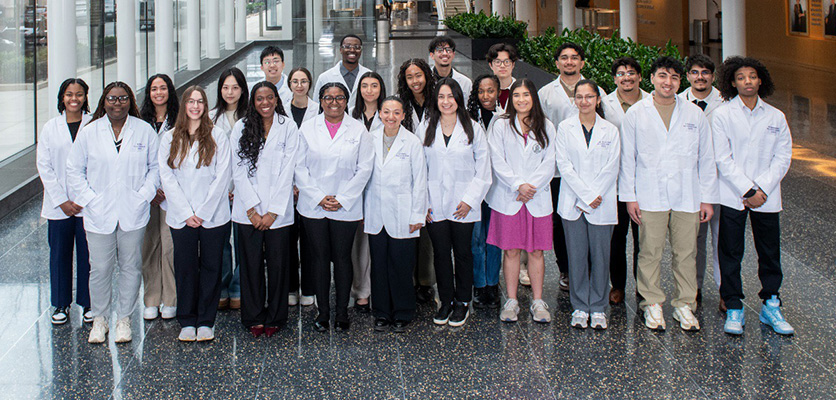-

Feinberg Faculty Inducted to Prestigious Honor Societies
Six Feinberg faculty members have been inducted into the American Society for Clinical Investigation (ASCI) and the Association of American Physicians (AAP), two of the oldest medical honor societies in the U.S.
-

Uncovering the Complexities of Cellular Cytoskeletons
Northwestern Medicine scientists have shed new light on the inner workings of some of the finest filament cellular structures, according to a study published in the Journal of Cell Biology.
-

Many Young Adults Have High Long-term Risk for Cardiovascular Disease, Study Finds
A recent Northwestern Medicine study published in JAMA has found that one in seven U.S. adults between the ages of 30 and 59 years have a high 30-year risk for cardiovascular disease.
-

Protein Implicated as Driver of Lung Cancer
Northwestern Medicine scientists have uncovered how a testis-specific protein contributes to tumor growth and progression when it is mis-expressed in lung cancer, according to a study published in Science Advances.
-

Fewer Long-Distance Runners Die of Cardiac Arrest, Study Finds
Fewer long-distance runners are dying from heart problems during organized races, according to a new study published in the Journal of the American Medical Association.
-

Sugary Drinks Linked to Gut Bacteria Changes and Diabetes
Sugary drinks have been linked to changes in the gut microbiome and higher diabetes risk in Hispanic and Latino populations, according to study published in Cell Metabolism.
-

Northwestern Launches Pioneering Medical Research Institute With $10 Million Gift From Trustee Kimberly Querrey, Bringing Her Total University Giving to $391 Million
Northwestern University Trustee Kimberly K. Querrey has made a $10 million gift to create and enhance the Querrey Simpson Institute for Regenerative Engineering at Northwestern University.
-

ALS Drug Effectively Treats Alzheimer’s Disease in New Animal Study
A small-molecule compound developed by Northwestern scientists improves neuron health in animal models of Alzheimer’s disease, according to a new study published in PNAS.
-

Study Identifies Link Between Body Clock Disruption and Metabolic Disease
Northwestern Medicine investigators have discovered how disruptions in circadian rhythm in our muscles combined with poor diet can contribute to the development of diabetes, according to a recent study published in Proceedings of the National Academy of Sciences.
-

Investigating Cytoskeletal Filament Formation
Scientists have uncovered new details about cellular filaments that play a critical role in wound healing, according to a study published in the Proceedings of the National Academy of Sciences.
-

Improving Patient Screening for Housing Instability
Using electronic health record data to measure how frequently someone changes their residential address may be an effective tool to screen for patients who may be experiencing homelessness, according to a Northwestern Medicine study published in PLOS One.
-

Leading Precision Medicine Expert, Mohamed Abazeed, MD, PhD, Named Chair of Radiation Oncology
Mohamed Abazeed, MD, PhD, associate professor of Radiation Oncology and co-leader of the Robert H. Lurie Comprehensive Cancer Center of Northwestern University’s Lung Cancer Program, has been named chair of the Department of Radiation Oncology.
-

NUDOCS Program Guides Aspiring Physicians on the Path to Medicine
Northwestern undergraduate students interested in pursuing careers in medicine recently participated in the NUDOCS program, an immersive experience designed to provide hands-on exposure to clinical and community healthcare settings.
-

New Key Genes in Parkinson’s Disease Identified Using CRISPR Technology
A new Northwestern Medicine study published in Science has identified a new set of genes that contribute to the risk of Parkinson’s disease, opening the door to previously untapped drug targets for treating the disease.
-

Novel Approach Improves Protein Characterization in Human Tissue
Scientists have developed a novel, robust proteomics technique that can more accurately identify and spatially characterize thousands of proteins in single cells within human tissue samples, as detailed in a recent study published in Nature Communications.
-

New Wearable Device is the First to Gauge Health by Sensing Gases Through Skin
Northwestern University scientists have developed the first wearable device for measuring gases emitted from and absorbed by the skin, according to a new study published in Nature.
-

IPHAM Public Health Summit Celebrates Advocacy and Community
Students, faculty, staff and public health leaders joined Northwestern University’s Institute for Public Health and Medicine (IPHAM) for the institute’s annual Public Health Summit at the Robert H. Lurie Medical Research Center on April 2.
-

Uncovering Mechanisms Driving Estrogen Receptor-Negative Breast Cancer
Northwestern Medicine investigators have discovered previously unknown metabolic changes that may contribute to the development of a subtype of breast cancer, findings which may inform new targeted preventives and therapeutics, according to a recent study published in Science Advances.
-

Food Insecurity Now, Heart Disease Later
Young adults experiencing food insecurity have greater risk of developing heart disease in midlife, even after accounting for other socioeconomic factors, according to a recent study.
-

Violent Reinjury in Firearm-Injured Children Linked to Neighborhood Factors
Children in areas with the lowest Child Opportunity Index — which reflects factors like education, social and economic resources — were over twice as likely to suffer another violent injury within a year after an initial firearm-related emergency room visit, according to a study published in JAMA Pediatrics.






